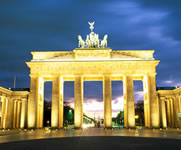The feudal system developed in the Middle Ages, which brought peace and stability to European states for many centuries. It was led by strong characters at every level of the hierarchy. We can thank each of these feudal lords for a more or less large chunk of culture and history. At the highest level there were the Kings and Emperors who were crowned by the Pope and were regarded as the temporal representative of God. Below them were dukes and counts who were the most powerful aristocrats in Germany. Bishops with their dioceses, the areas they controlled, were of equal rank in terms of power.
Since hardly any King could maintain a regular army, the Kings were dependent on their barons and dukes. They often found it very difficult to keep these under control. In Germany there were powerful reigning princes, who ruled their fiefdoms as independent states and maintained costly courts. A visit to their palaces and residences will bring this magnificent era to life once again.
Prestigious addresses in feudal times:
Charlemagne (768-814),
King of Franconia and first German Emperor, resided in the Emperors' palaces at Aachen and Ingelheim. In Aachen he gathered important scholars around him who provided the cultural impetus.
Otto I., known as the Great (936-973),
German King and Emperor, defeated the Hungarians on the Lechfeld and began to introduce Christianity into Eastern Europe. He resided chiefly at the imperial palaces in Goslar.
Henry II. (1002-1024),
German King and Emperor, conquered Bohemia and founded Bamberg as a missionary bishopric. He resided at the imperial palace in Goslar and Bamberg.
Frederick I., Barbarossa (1152-1190),
German King and Emperor, promised Pope Eugene lIl help against the Normans and Romans in the Treaty of Constance. He resided at the imperial palaces of Gelnhausen and (Bad) Wimpfen.
Henry the Lion (1142-1195),
opponent of Barbarossa, was deprived of his rank of duke by his peers in a legal dispute. His residence was Dankwarderode castle.
Henry VI. (1190-1197),
German King and Emperor, forced King Richard I of England (Cocur de Lion - the Lionheart) to make an oath of allegiance and made England officially a German fiefdom. His residence was Trifels castle.
Henry VII. (1308-1313),
German King, acquired control over the Bohemian hereditary land through the marriage of his son John. His residence was the Kaiserburg in Nürnberg and the Saalhof at Frankfurt.
Louis of Bavaria (1314-1347)
became German King simultaneously with Frederick the Beautiful in a dual election. His residence was the "Old Court" in Munich.
King Frederick I of Prussia (1688-1713)
ruled from Charlottenburg castle, Berlin.
King Frederick the Great of Prussia (1740-1786)
resided in Sanssouci castle and in the "new palace", both in Potsdam.
Elector August the Strong of Saxony and King of Poland (1694-1733)
resided in the Prince's residence of Dresden castle at Pillnitz and at Moritzburg castle.




